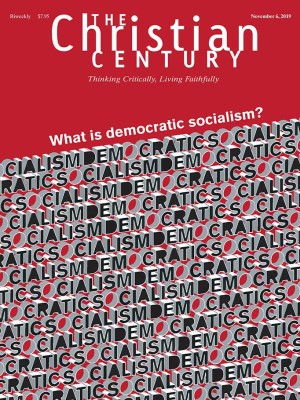The Mega podcast draws mega laughs
The evangelical satire also offers insight and empathy.

Mega is an improvised comedy podcast that pretends to be a podcast created by a megachurch called Twin Hills. The two cohosts, Hally Labonte (Holly Laurent) and Gray Hoss (Greg Hess), riff about their lives and spiritual struggles before introducing another member of the Twin Hills staff or community, who is played each week by a different comedian guest.
The satire builds slowly over many episodes. It is sharp and sometimes unsparing, but also tempered by a humane understanding of what pulls people into white evangelical culture and how deeply it forms people even after they leave it. If you’ve ever found yourself almost cracking a biblical joke at a party only to realize no one will understand you, this podcast is for you.
Read our latest issue or browse back issues.
The character of Hally is the heart of the show, not least because Laurent grew up in white evangelical culture and her biblical recall could give any seminarian a run for their money. She transitions every segment with a biblical zinger: “Just like King Xerxes picked Queen Esther after a solid year of beauty treatments, we’ve picked a beauty of a guest today.”
But her real talent lies in reflecting on how her private devotions are bearing fruit in her life. For example, commenting on 2 Kings 2:23, where the prophet Elisha curses some teenagers for mocking his baldness and calls for them to be mauled to death by two bears, she says earnestly: rather than think of this as the vindictive murder of 42 children to protect the wounded pride of a shallow prophet, we should think about how God is always on our side and will act on our behalf if we call on his name. Laurent’s sharp comedic delivery lands the satiric punch without mocking how hard Hally is working with the limited exegetical tools she’s been given.
Her cohost, Gray, leads the church’s teen ministry, Climax. He is obsessed with fitness, especially CrossFit, and equates his physical appearance with holiness. He has little interest in dating and experiments frequently with “cool” fashion trends like leather cuffs and tight-fitting clothing. The implication that he is closeted is unmissable. His expressions of unexamined sexuality are understood by the church as signs of his proclivity for “youth culture.” Ripped jeans notwithstanding, he seems decidedly unfit for youth ministry. He shames students in the name of spiritual transparency and mistakes his own vanity for spiritual gravitas.
The satire is both obvious and layered; the listener is often both cringing and laughing. Most satires of white evangelical culture (The Righteous Gemstones, for example) are drawn so starkly it is hard to see the real humans underneath the mockery. In Mega that only happens when the outside guests make that mistake.
One of the weakest episodes is “Ribbed for His Pleasure,” with Megan Kellie playing Regan Shelly, the leader of a women’s ministry called Exhale. Kellie goes straight for The Handmaid’s Tale territory, describing a ministry that teaches women never to speak in men’s presence or express one’s individual personality. Evangelical teaching about gender could certainly be pressed to this extreme, but anyone inside it knows that the patriarchy is far more confusing and insidious, often claiming women as eloquent defenders of their own subservience in powerful spiritual language.
Far more successful—both in terms of capturing the language of white evangelical culture and in terms of pure humor—is “The Marriage Bed Is Undefiled,” with Christina Anthony playing Christia Anferny, who leads a women’s ministry to help divorced or widowed women recover their sexual purity and abide in the romance of Jesus. The satire captures the double standard by which women are asked both to be the keepers of purity outside of marriage and to give themselves over to reckless sexual abandon within it.
The show doesn’t avoid the political or public scandal of evangelicalism. Hally and Gray try to wrestle through the brave new world in which white evangelicals are supposed to defend Russia and North Korea after decades of lambasting their communist atheism. They openly puzzle over the mysterious will of God in guiding a leader like Trump, who defies so many of the moral teachings they are struggling to enact or teach. The implicit whiteness of Twin Hills comes through clearly, though still subtly, with the implication that this brand of Christianity will adapt itself to white supremacist politics at any cost.
If Mega doesn’t bite as hard as it could in these moments, it might be because the show is a kind of ministry of its own. For listeners still inside white evangelical culture but frustrated and fed up with its hypocrisy, and even more so for folks who have left it behind, Mega offers spiritual healing through laughter. It is satire without bitterness; it allows compassion without excusing moral and spiritual failings. Plus it understands every biblical joke you could ever make, which is worth a year of Queen Esther’s beauty treatments.
A version of this article appears in the print edition under the title “Mega laughs.”







